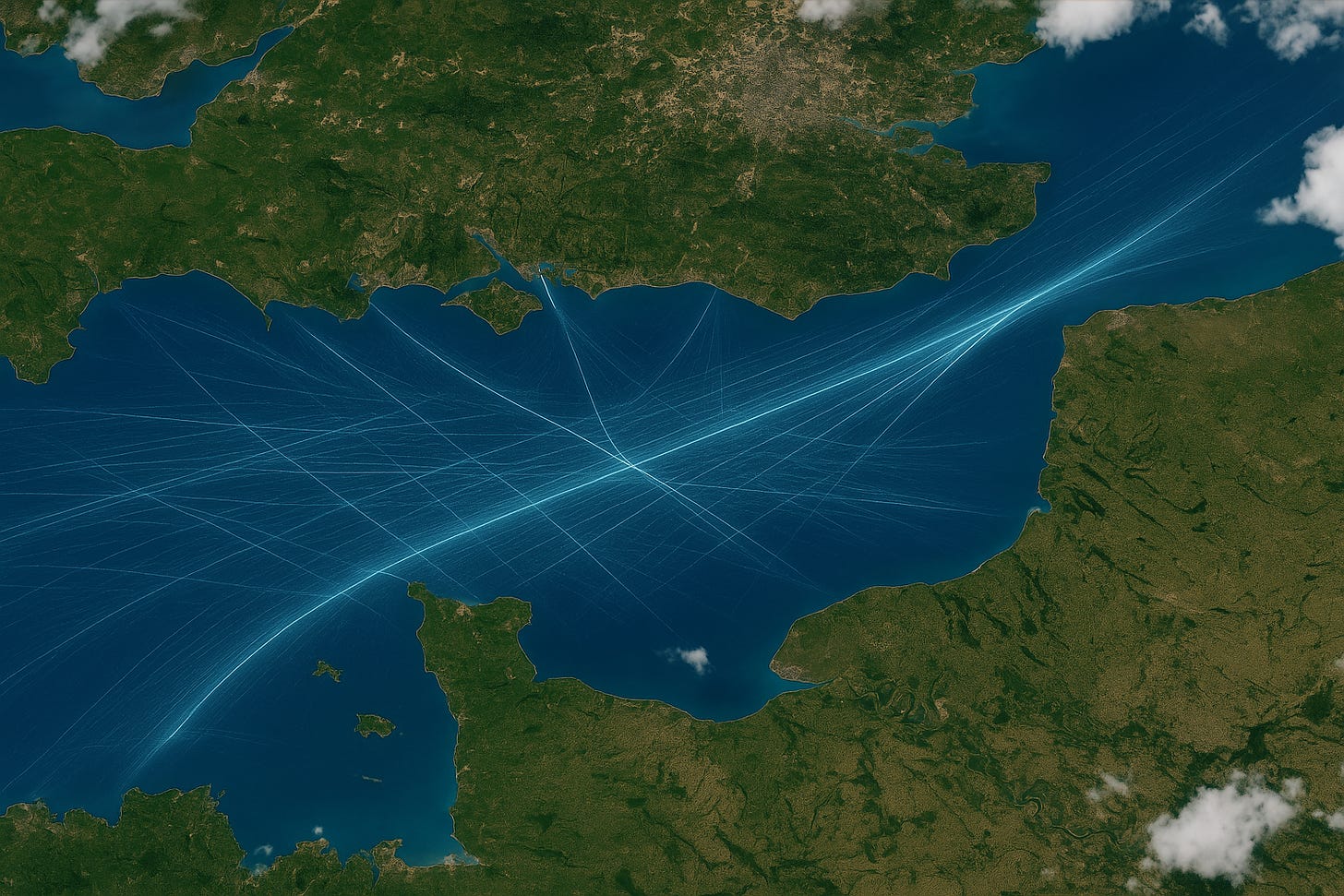Turning the Tide: Can Technology and Trust Coexist in the English Channel?
A story about marine conflict, political contradiction, and the quiet tools that might reconcile them.
Ships churn through the Channel every hour, but none feel the sound they leave behind. Beneath the surface, dolphins flinch and whales scatter - all because of a noise we don’t hear.
Last year, the UK banned bottom trawling across 4,000 square kilometres of protected water. The French protested. The fish said nothing. But the seabed had something to say.
So begins a strange experiment in coexistence. It's messy, political, and not nearly fast enough - but it’s happening. The question is: can a corridor of conflict become a channel of cooperation?
The Quiet War Beneath the Waves
The English Channel is one of the busiest marine zones on the planet. It’s where industry, migration, and military converge - and so do harbour porpoises, dolphins, cod, and mackarel. It’s not just crowded. It’s contested.
Marine mammals are dying in nets they can’t see, from ships they can’t avoid, under policies that don’t align. The systems designed to feed and fuel us are silencing the ocean. That silence is a kind of violence - one most people never notice.
And yet, the tools to fix this are already here.
Science has acoustic deterrents. Conservation groups have seagrass projects. Governments have mandates. What’s missing is not technology or data. It’s rhythm. It’s agreement. It’s political and ecological timing.
When Conflict Forces Convergence
It’s a strange kind of harmony when France and the UK, adversaries over quotas and sovereignty, start adopting the same solutions: pingers, REM systems, seagrass rewilding. Not in lockstep - but in parallel.
Some of this is accidental. Some of it’s inevitable. And some of it is, perhaps, the only way forward: coordinated drift instead of stalemate.
Simultaneously, fishers and conservationists - usually opposed - are trialling the same technologies. Pingers on nets reduce bycatch dramatically. Remote electronic monitoring adds accountability without confrontation. Seagrass meadows are reappearing where trawls once scraped the ocean floor.
It's not consensus. But it’s momentum.
Quiet Wins, Friction, and the Wild
In Cornish waters, porpoises returned as soon as the pingers were switched off - a small but unmistakable sign that harmony, in some form, is possible.
Then came the setback. France’s protest over the UK’s trawling ban reminded everyone that conservation is never just about data. It’s about sovereignty, politics, and pride. Environmental progress, it turns out, is reversible - unless people agree to hold the line.
And in the background, something extraordinary: real-time salmon tracking across five rivers, using DNA and sensor arrays. Forensic ecology. Science doing what diplomacy can’t.
From Battleground to Blueprint
Five approaches. One vision. That the sea can feed us without bleeding life from it.
The convergence of deterrents, monitoring, restoration, and policy is starting to create an unintentional alliance. No one controls it. But everyone contributes to it - by failing to resist change entirely.
The Channel is no longer just a battleground. It’s becoming a laboratory for coexistence. Not perfect, not permanent but promising.
What Else Might We Learn to Share?
Technology didn’t solve the conflict. People choosing to listen did.
This story isn’t really about dolphins, or noise, or even fishing. It’s about how we manage the spaces between us - and whether we’re willing to share them.
If we can learn to share the Channel, what else might we learn to share?
Publicly accessible sources
Supporting the data, claims, and examples in this article:
1. DDD Pingers and Bycatch Reduction
ScienceDirect article on acoustic deterrents
2. Remote Electronic Monitoring (REM) Overview
Marine Conservation Society on REM benefits
3. Seagrass Carbon Capture Data
WWF UK report on seagrass restoration and carbon sequestration
4. Noise Pollution Trends and Impacts
OceanCare briefing on ocean noise pollution
5. Slowing Ships to Reduce Noise and Collision Risk
Clean Arctic Alliance campaign material
6. Highly Protected Marine Areas (HPMAs) UK Announcement
UK Government press release quoting Rebecca Pow
7. AMARCH Project – Real-time Salmon Monitoring
Interreg SAMARCH project overview and results


